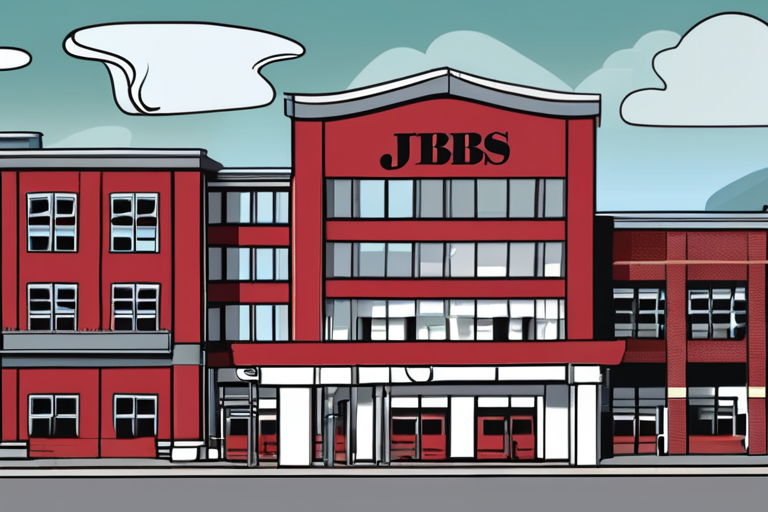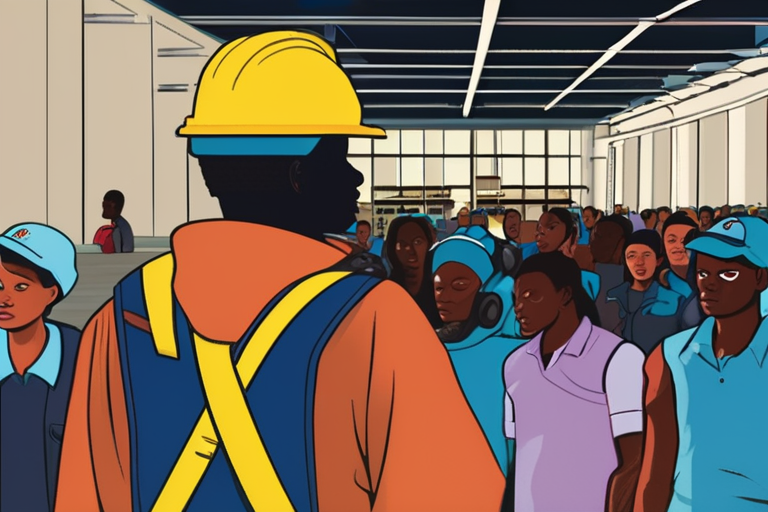Haitian Migrants Accused of Human Trafficking at JBS Meatpacking Plant
In a shocking case of exploitation, hundreds of Haitian migrants who flocked to the Rainbow Motel in Greeley, Colorado, for jobs at the JBS meatpacking plant have been accused of human trafficking and exploitation by the union representing workers. The allegations come after a TikTok video made by Mackenson Remy, a migrant from Haiti, went viral, drawing hundreds of Haitians to the facility.
According to an investigation by the Food Environment Reporting Network, Remy's video was made in 2023, but it wasn't until February 2025 that the union representing workers at JBS accused Remy and the company of human trafficking. The union alleged that migrants were being lured to the plant with promises of high-paying jobs, only to find themselves working long hours for low wages.
"We've seen a pattern of exploitation where migrant workers are brought in on false pretenses," said Ted Genoways, a reporter with the Food Environment Reporting Network. "These workers are often promised good pay and benefits, but when they arrive, they're met with substandard conditions and little to no job security."
The Rainbow Motel, which housed many of the Haitian migrants, was initially touted as a solution for migrant workers looking for jobs at JBS. However, an investigation by the Food Environment Reporting Network found that the motel's owner, Mary Anne Andrei, had close ties with JBS and was profiting from the influx of migrant workers.
"We're not just talking about exploitation; we're talking about human trafficking," said Genoways. "These workers are being brought in and used as cheap labor, often under threat of deportation or other forms of coercion."
The allegations have sparked outrage among advocates for migrant workers' rights, who say that the case highlights the need for greater protections and regulations around migrant labor.
"This is a classic example of how corporations will do whatever it takes to keep costs low," said Maria Rodriguez, a spokesperson for the advocacy group Migrant Justice. "We need stronger laws and regulations to prevent this kind of exploitation from happening in the first place."
As the investigation continues, JBS has denied any wrongdoing, stating that they take allegations of human trafficking seriously and are cooperating fully with authorities.
The case is a stark reminder of the complexities surrounding migrant labor and the need for greater transparency and accountability in the industry. As Genoways noted, "This story highlights the darker side of globalization and the exploitation of migrant workers."
Background:
JBS is one of the largest meat producers in the world, with facilities across the globe. The company has faced criticism in the past over its treatment of migrant workers, who often work long hours for low wages.
The Rainbow Motel, where many Haitian migrants were housed, was initially touted as a solution for migrant workers looking for jobs at JBS. However, an investigation by the Food Environment Reporting Network found that the motel's owner had close ties with JBS and was profiting from the influx of migrant workers.
Additional Perspectives:
Experts say that the case highlights the need for greater protections and regulations around migrant labor. "We need stronger laws and regulations to prevent this kind of exploitation from happening in the first place," said Maria Rodriguez, a spokesperson for Migrant Justice.
The case also raises questions about the role of social media platforms like TikTok in facilitating human trafficking. "These platforms have a responsibility to ensure that their users are not being exploited or coerced into participating in human trafficking schemes," said Genoways.
Current Status and Next Developments:
The investigation is ongoing, with authorities working to determine the extent of JBS's involvement in the alleged human trafficking scheme. The company has denied any wrongdoing, stating that they take allegations of human trafficking seriously and are cooperating fully with authorities.
As the case continues to unfold, advocates for migrant workers' rights say that it highlights the need for greater protections and regulations around migrant labor. "This is a classic example of how corporations will do whatever it takes to keep costs low," said Rodriguez.
*Reporting by Motherjones.*



 hoppi
hoppi

 Hoppi
Hoppi

 Hoppi
Hoppi

 Hoppi
Hoppi

 Hoppi
Hoppi

 hoppi
hoppi











